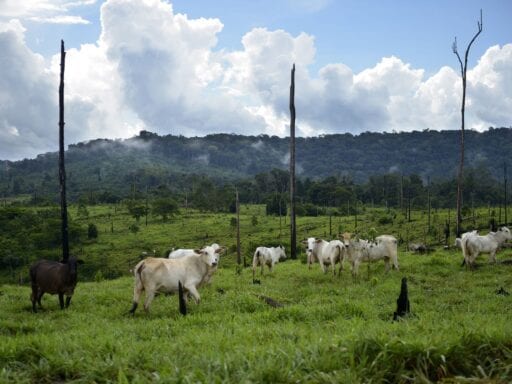Brazilians on the edge of the Amazon rainforest are working with cattle ranchers — not against them — to save the climate.
On the edge of the Amazon rainforest in Brazil, there’s a small city called Alta Floresta. It was settled four decades ago when people came in to ranch cattle. They cut down big tracts of the rainforest and set fire to the trees in an environmentally destructive process known as slashing and burning.
This land would quickly degrade, forcing ranchers to slash and burn more land. And the cattle they brought in compounded the environmental problems by farting and burping out methane — a greenhouse gas that’s especially bad for our planet.
It’s a tragedy that’s played out along huge tracts of the Amazon. In Brazil alone, 450,000 square kilometers of rainforest have been cleared for beef. Given how important the rainforest is for the Earth’s health — it’s sometimes known as “the lungs of the planet” — this phenomenon is a dangerous driver of climate change.
Vando Telles grew up in Alta Floresta. His father is a cattle rancher. So are many of his neighbors. And he watched them go through economic difficulties as their land degraded. So he decided to look for alternatives.
He went to university to study agriculture, and he learned a range of sustainable ranching techniques that he believed could turn things around for the ranchers back at home. He realized that he could help the environment by working with the ranchers, not against them, and that this would help the ranchers, too. It’s a win-win.
On this episode of the Future Perfect podcast, we talk to Vando Telles about his uphill battle to bring those alternatives to his community. And we speak with Christina Selby, a freelance reporter who traveled to Brazil to write about Vando Telles’s company, Pecsa, which has had some dramatic success: It has brought down greenhouse gas emissions on its ranches by a whopping 85 percent.
Together, Telles and Selby help us understand how Pecsa’s success might be scaled to other places, and what that might mean for the environment.
Further reading:
- Christina Selby’s story about Vando Telles’s company can be found at Scientific American
- Vox video has an in-depth explainer on deforestation in the Amazon and on the invasion of indigenous land in Brazil
- Vox video also has an explainer on why eating beef speeds up climate change
- Vox’s Umair Irfan traveled to Brazil last year to report on deforestation and climate change
- Want to fight climate change effectively? Sigal Samuel recommends donating to these high-impact organizations.
This podcast is made possible thanks to support from Animal Charity Evaluators. They research and promote the most effective ways to help animals.
Sign up for the Future Perfect newsletter. Twice a week, you’ll get a roundup of ideas and solutions for tackling our biggest challenges: improving public health, decreasing human and animal suffering, easing catastrophic risks, and — to put it simply — getting better at doing good.
Millions turn to Vox each month to understand what’s happening in the news, from the coronavirus crisis to a racial reckoning to what is, quite possibly, the most consequential presidential election of our lifetimes. Our mission has never been more vital than it is in this moment: to empower you through understanding. But our distinctive brand of explanatory journalism takes resources. Even when the economy and the news advertising market recovers, your support will be a critical part of sustaining our resource-intensive work. If you have already contributed, thank you. If you haven’t, please consider helping everyone make sense of an increasingly chaotic world: Contribute today from as little as $3.
Author: Sigal Samuel
Read More



